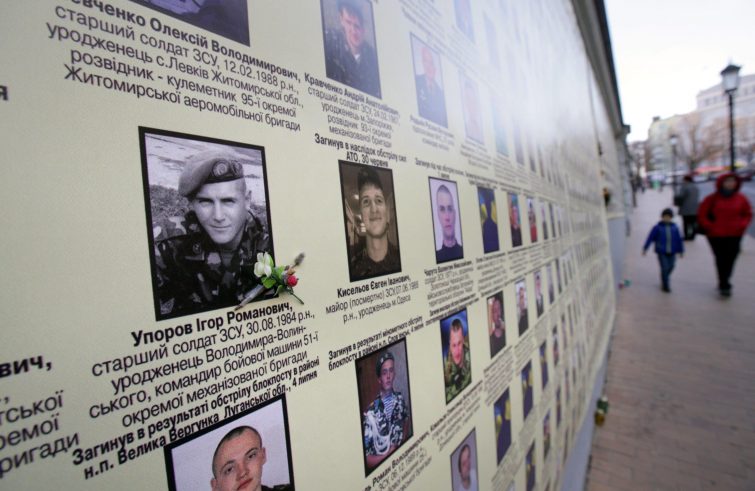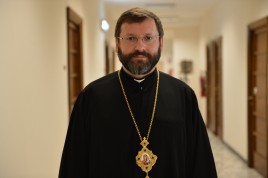
 “The mentality of war resurfaces with its darkest and most horrendous guise. It represents a death threat to the people living along the border of eastern Ukraine. In the name of these people, we are crying out: stop all military operations, stay true to your ceasefire commitments, put down the weapons. Peace is possible. It must be sought, desired, constructed and we, as representatives of the Christian Churches and religions, will do all we can to encourage fraternity among our people and invoke the gift of peace through prayer.” This was the heartfelt appeal of His Beatitude Sviatoslav Shevchuk, Head of the Ukrainian Greek Catholic Church, following the remarks on the situation along the Donbass border made in Rome by Pope Francis at the end of the Regina Coeli prayer.
“The mentality of war resurfaces with its darkest and most horrendous guise. It represents a death threat to the people living along the border of eastern Ukraine. In the name of these people, we are crying out: stop all military operations, stay true to your ceasefire commitments, put down the weapons. Peace is possible. It must be sought, desired, constructed and we, as representatives of the Christian Churches and religions, will do all we can to encourage fraternity among our people and invoke the gift of peace through prayer.” This was the heartfelt appeal of His Beatitude Sviatoslav Shevchuk, Head of the Ukrainian Greek Catholic Church, following the remarks on the situation along the Donbass border made in Rome by Pope Francis at the end of the Regina Coeli prayer.
Your Beatitude, can you tell us what is happening? What worries you the most?
People in Ukraine are facing a time of great fear caused by increased Russian military presence along the borders of the country and on the Black Sea. We have information from reliable sources that over 100,000 Russian troops have been deployed and that they are equipped with sophisticated weapons. Experts say the Russian troops’ concentration is the largest since 2014. This military build-up poses a serious threat of large-scale military invasion by the Russian Federation. From what we have gathered so far, Russia justifies this presence on the grounds of its right to conduct military exercises on site. On the Ukrainian side, however, this amounts to serious military and political pressure.
The concern is that it could be the start of a serious escalation. As the Holy Father says, with war you gain nothing but lose everything.
Why now? What has precipitated the situation?
In fact, we are completely at a loss as to why the situation has deteriorated to such an extent. Our incumbent president has consistently stated that the cornerstone of his programme is the pursuit of a peaceful solution to the conflict in Donbass, and he has been doing his utmost to avoid military conflict. The whole of Ukrainian society agrees on this. The ceasefire agreement had been in place for a year, but at the beginning of 2021 the border situation in Donbass escalated. Every day we receive reports of young soldiers being killed, with over 50 soldiers dead since the beginning of the year. A task force has been set up to implement the Minsk Agreements and to prevent the use of weapons, opening humanitarian aid channels.
It’s hard to understand why the situation has deteriorated.
The Pope appealed for “gestures that promote mutual trust and foster reconciliation and peace.” Is it still possible to pursue the path of diplomacy?
Everybody agrees – civil society, politicians and military leaders – that this conflict is not going to be resolved through military intervention. Therefore, the path of diplomacy is being pursued as envisaged in the ‘Normandy Format’ talks, involving the presidents of France, Germany, Russia and Ukraine, to foster dialogue. However, these agreements are not bearing immediate and direct fruits on the ground.
The Pope is also concerned about the serious humanitarian situation of the population. What is the situation in this respect?
There were some crossing points before the epidemic. Many people from the occupied zone in Ukraine came to collect their pensions and managed to live on that small amount of money. It was also through these crossing points that the International Red Cross and Caritas tried to deliver humanitarian aid to the population. But since a state of emergency was declared due to COVID, all those passageways have been closed. This led to an aggravation of the crisis. As Church we are in close contact with our priests and parishes, but communication is becoming increasingly difficult. If a military attack occurred on top of this, it would cause a humanitarian tragedy. We are therefore grateful to the Holy Father for having drawn the attention of the international community to the fact that a military solution is not an option.
In order to pursue the path of peace, it is necessary to withdraw the troops. The use of weapons is unacceptable, especially in this area and under these circumstances.
Do you wish to send an appeal to Europe?
I am the president of the Pan-Ukrainian Council of Churches and Religious Organisations, a body that brings together Catholic, Orthodox, Protestant Churches, Muslims and Jews. We recently issued an appeal for a ceasefire for Easter, so that the Orthodox Easter celebration in Ukraine in a couple of weeks may be accompanied by the sound of Easter chants and church bells, and not by the sound of gunfire.”











